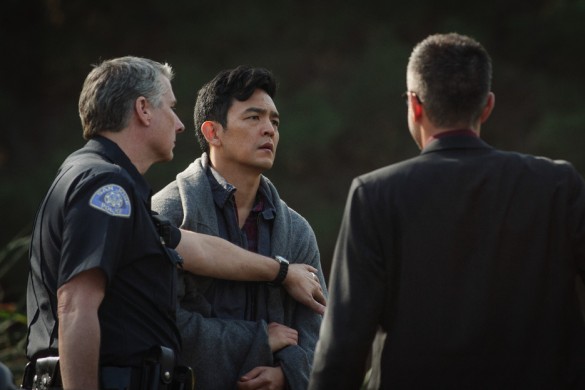Director David Leitch knows how to engineer a finely tuned actioner machine, as evidenced by the “John Wick” film he co-directed, “Atomic Blonde” and “Deadpool 2.” However, even if some of those films pack a mighty punch and has no qualms about being overly violent and gory, they tend to draw out their ending. Unfortunately, it’s not any different in his latest film, “Bullet Train. While the fun interconnective storytelling styles and brash comedy draws from Quentin Tarantino and Guy Ritchie, it is too smart for its own good. And despite its terrific international cast, it misses an opportunity to celebrate an Asian-led cast leading a blockbuster movie.

In the film, Brad Pitt plays Ladybug, an assassin looking to get back into the game with a simple snatch and grab job. Though he believes himself to be very unlucky, his handler, Maria Beetle (Sandra Bullock), thinks something easy will help him regain some of that lost confidence. All he must do is board a train and retrieve a briefcase. The only problem is that there are other assassins on board whose job is to take the same briefcase. And to make things even more complicated, they will soon discover that despite their similar and conflicting objectives, they have all crossed paths at some point in their lives.
The other assassins on board are The Father (Andrew Koji), a Japanese assassin seeking vengeance for an attack on his son, who is currently in the hospital. Lemon (Brian Tee Henry) and Tangerine (Aaron Taylor Johnson), whose job is to bring back the White Death’s (Michael Shannon) face-tattooed son (Logan Lerman) – who is identified as The Son. The Wolf (Benito A Martinez Ocasio) is a groom who is seeking his own brand of vengeance after the death of his wife and family during a wedding. The Prince (Joey King) is a narcissistic teen with sociopathic tendencies. And The Hornet (Zazie Beetz), an American assassin posing as a train crew member.
These characters each have their quirks to make them stand out. Despite the rather sour codename, Lemon is a cheery assassin who equates everyone he meets with Thomas the Tank Engine characters. It’s a bit that gets on Tangerine’s nerves. Ladybug believes himself to be incredibly unlucky and often references therapy methods to calm himself down – which is incredibly difficult to do when everyone tries to kill you, and you don’t know why. The White Death is the classic chief villain who worked his way up the crime organization ladder to end up on top by being a Judas. And so on and so forth.
So while the character has charming personalities and their motives are simple, they don’t exactly bring anything new to the table. It’s just an explosive stunt-based actioner with modern-day aesthetics. It’s a lot of visual fun on the surface, for sure. But it certainly lacks depth and originality. And part of that has to do with the fact that we’ve seen this somewhere before. Maybe not in one film, but across others. Ladybug is the disillusioned assassin, a dynamic duo who can’t agree on anything, and the kid sociopath. It may be fun at first, but because of the film’s lengthy runtime, it’s a shtick that runs its course very fast.
Based on a novel by Kōtarō Isaka, Zak Olkewick’s script makes “Bullet Train” a claustrophobic experience. There’s a lot more boarding than unboarding, and most of the action takes place within the confines of the fast-moving train. Assassins race up and down the cars, often passing each other without knowing their connections. And though their movements seem wasted, they are merely convenient setups for a more significant and exciting set piece. At times, the storytelling process can be over complicated, with these moments planted so far back that we forget about them. Even a humble water bottle has an arc and plays a pivotal role. It may seem silly at first, which is ideally suited for a film as colorful and unevenly comedic as this.
Add to that the zany amount of cameos stars that takes away from the character arcs and out of the action sequences for a quick laugh. For instance, when Koji’s character doesn’t get to put up a fight until the very end because he remains tethered to King’s character for reasons that are, as consistently aforementioned, overcomplicated. And Sanada’s commanding presence doesn’t take effect until the film’s end. Despite that, he brings a balance of action and comedy to the story. So the film’s convenient connections try to come off as clever but are too smart for its own good. Worse yet, it doesn’t know when to quit while ahead and doubles down on the confusion.
So “Bullet Train” tries to compensate for its incomprehensibility by revealing how the respective characters are connected through a series of quick flashbacks that ultimately build up to why they all conveniently found themselves on the same train. As such, he uses these flashbacks to fill in the gaps while having us forget how much time has passed in real-time.
And “Bullet Train” has plenty of fun playing off the fact that though these assassins are highly professional, they found themselves hilariously incapable of doing a simple job. Pitt’s Ladybug is a play on the assassin who wants back into the game and yet is fated to his bad luck. For Henry and Johnson’s Lemon and Tangerine, there’s this hilarious sibling banter between the two. They can’t even agree on how many kills they got on the last job – which takes us to another flashback that gives an actual bloody headcount. And the friction between the two carries on outside of the action. Lemon is the one who can read people and compare them to Thomas the Tank Engine characters – which is something that gets on Tangerine’s nerves, so much so that he threatens to shoot his twin in the face. To add to the comedy, rival assassins and henchmen point out the obvious: one is white, and the other is black.
So Henry and Johnson’s chemistry tends to overshadow Pitt’s performance as the lead. Though he carries a heavy amount of fun choreographed action with various assassins lying in wait between the quiet cars, concession cars, and the front engine, it’s not enough to outshine what the Twins bring to the film.
Another unfortunate shortcoming of “Bullet Train” is how it underutilizes its promising Asian cast. Though the source material features an ensemble of ethnically ambiguous characters and its international setting, the film adaptation’s international cast playing these charming assassins feels overly familiar. And the fact that there are Japanese characters in a film that’s on a train that goes from Tokyo to Kyoto, they aren’t the center of the story. So it’s a missed opportunity to showcase that Asian actors in leading roles can carry a blockbuster.
And so, “Bullet Train” is not short on action. In fact, there may be too much of it. So much so that it becomes an insufferable experience. While the film tries to balance itself out with its clever comedy of well-placed set pieces and wacky fight choreography, it would have done itself well by at least giving us some time to breathe and make sense of the story. That being said, if you’re looking up for something fun that doesn’t require any prior knowledge from other films or something that’s very heavyhanded, then you might want to pick up a ticket to the unabashedly violent and gory actioner.
7.5/10











